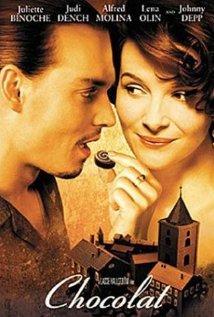
Chocolat is sinfully scrumptious cinema. Rarely does a film look good enough to eat, but Lasse Hallstrom (My Life as a Dog, What’s Eating Gilbert Grape?) gives us a fairy tale that will tease your taste buds. Really. But feast your eyes — you won’t do any damage to your waistline.
Set in an idyllic French country village in 1959, Chocolat tells a simple story, a fable. Once upon a time, a “sly wind from the North” blows the beautiful gypsy, Vianne (Juliette Binoche), and her daughter, Anouk, into the village. Their arrival, just in time for Lent, disrupts the ancient ordered way of life. The Mayor, the Counte de Reynard (Alfred Molina), is the self-appointed moral authority of the community. He even scripts and rehearses Father Henri’s Lenten homilies which call for “abstinence, reflection, and sincere penitence.”
Vianna shocks and startles the staid community by her indifference to the Mayor’s conventions and intimidation. She is an unwed mother. She does not attend church. She brazenly opens her chocolaterie — her tantalizing and seductive treats, her ancient recipes, boldly and temptingly set on display for all the the penitent and sober worshippers to long for as they wind their way to the church.
Therein lies the conflict and questions of the film. Does God approve of pleasure? Are joy and Christianity incompatible? Is religion repressive? Does the Christian faith offer any hope that hurting people can find healing for the deep longing of the human spirit?
Ironically, the one who brings joy is herself haunted by sadness, the weariness of being blown by the wind and never being truly at home, the ache of shame and rejection. But Vianna meets a river wanderer, Roux (Johnny Depp), and the gifts of kindness and loyalty that he offers her have the same magical effect upon Vianna that her chocolates have upon the good people of the village.
This is a fairy tale in which a cup of hot chocolate can soothe away an old woman’s fear of dying, chocolate covered almonds can tame the anger of a selfish husband, and truffles can give a lad courage. This is a romanticized reminder that age-old gnostic asceticism is still with us and still has the power to crush and wound even the most delectable of God’s creations, men and women who bear the glory of his image. Chocolat, much like Babette’s Feast, invites us to contemplate what life would be like without beauty and the joy of delighting in good things.
-Steve Froehlich


